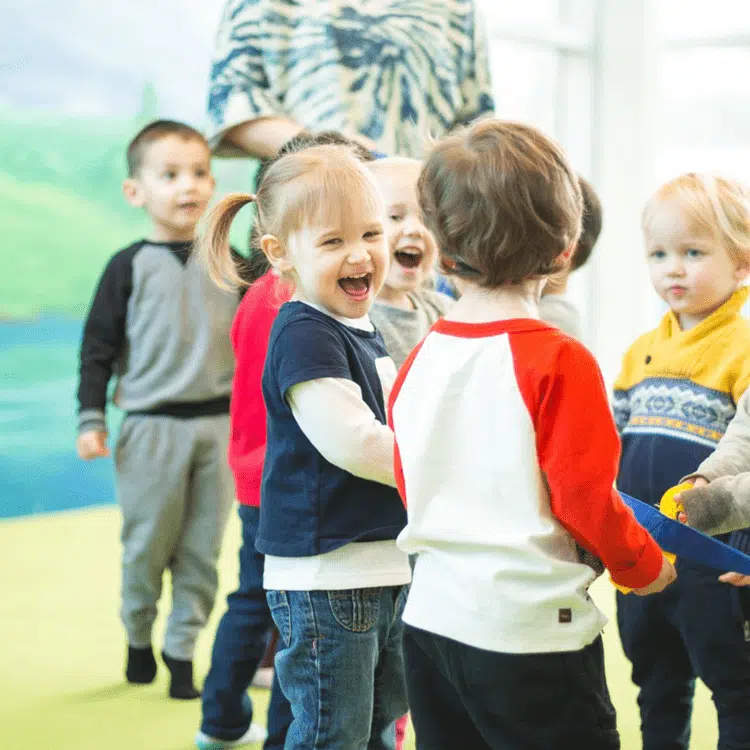Article At A Glance:
- Parents can help their children develop essential early social skills at home by setting positive examples and using “thinking out loud” strategies.
- Teaching basic conversation and social skills through role-playing games at home can boost a child’s confidence in making friends.
- Modeling warmth, respect, and kindness in interactions with others effectively teach desirable social behavior.
- Facilitating playdates with classmates and participating in small-themed activities can help children develop lasting friendships.
Little is more exciting for a child than entering preschool and expanding social connections with other kids. Sometimes, however, children are not immediately ready to meet friends in a new setting — and that’s normal.
Bubbles Academy provides some practical tips below on how to help your child make friends during their preschool years.
Build Essential Early Child Development Social Skills at Home
Every youngster learns foundational social skills at home. Their early experiences shape their ability to communicate, cooperate, and connect with others. Setting positive examples — taking turns, being flexible, and seeing things from another’s point of view — are subtle but powerful teaching tools.
Using “thinking out loud” strategies with your child is also highly useful, as it teaches them how you react to different social situations.
Teach Your Child Crucial Conversation and Social Skills
The first step in helping your child make friends is teaching them how to engage with others. Simple things like saying “hello,” asking questions, and responding when spoken to are crucial social skills.
Practice these skills at home through role-playing games. You might pretend to be a new classmate and guide your child on introducing themselves, asking a friend to play, or taking turns in conversations.
Teaching your child to maintain eye contact, wait for their turn to speak, and ask follow-up questions fosters healthy communication. These small yet significant interactions are the foundation of making new friends.
Show Your Child How To Express Warmth and Respect
As mentioned above, many of the best tips on how to help your child make friends focus on modeling desired behaviors. Children learn by observing and intently watching how you interact with others. Be mindful of how you demonstrate desirable social behavior — show kindness, respect, and warmth in your interactions with family members, friends, or strangers.
Think of ordinary trips to the park or grocery store as an opportunity to show your child how to greet people and respond to their social cues. Encourage your child to express compliments and show interest in what others are doing. The skills they develop will boost confidence when meeting new peers.
Be Your Child’s Emotion Coach and Nurture Their Empathy
Empathy is a crucial social-emotional skill that allows children to understand and share the feelings of others and is an essential part of developing preschool friendships. As a parent, you can help your child identify and name their emotions. You can also teach them how to respond to the feelings of others.
For example, when you see an upset child, encourage your child to ask if they’re okay or offer a comforting gesture. Consider directing them in ways that help them develop an understanding of other people’s perspectives and why they do things.
Create a Secure Social Environment for Anxious Children
For some children, new environments like preschool can trigger anxiety or shyness, especially when it comes to making new friends. Help your child prepare by creating a secure and supportive social environment. Introduce them to smaller, controlled interactions with family members or close friends. Gradually work up to more extensive group settings.
A great tip for helping your child make friends is to talk openly about your child’s feelings. This simple method can relieve much of their anxiety. Let them know it’s normal to feel nervous when meeting new people and reassure them that social situations will become easier with time and practice.
Providing support and encouragement are some of the most valuable strategies for helping your child develop the confidence needed to form lasting preschool friendships. When kids experience the joy that comes with making new friends, they begin to build on their successes.
Facilitate Playdates and Social Activities to Build Lasting Preschool Friendships
Once your child feels more at ease, arrange playdates with preschool classmates. Small, themed playdates reinforce social skills in a fun, relaxed setting. Start with one-on-one interactions or minor group activities, which are often more comfortable for young children.
Observe your child’s behavior during playdates and provide gentle guidance if needed. Children are eager to participate in activities they enjoy and can learn about healthy communication and understand social dynamics as they do.
Additional Read: How the Arts, Play, and Social-Emotional Development Benefit Preschoolers
Bubbles Academy Fosters Children In The Delightful Journey Of Forming New Friendships
Bubbles Academy believes fostering healthy, lasting friendships is vital to early child development. Our year-round preschool program and child classes are designed to nurture your child’s social skills through play, creativity, and peer interaction. These classes include Art, Music, Movement, Pop-in Art, Skill Development, and Preparing for Preschool.
We hope these tips on how to help your child make friends are helpful. Bubbles Academy strives to provide preschool children with a supportive and nurturing environment that enhances the rewards of making new friends. If you want to know more about our programs, contact us online or call (312) 944-7677

